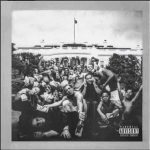Every Friday, Atwood Magazine’s staff share what they’ve been listening to that week – a song, an album, an artist – whatever’s been having an impact on them, in the moment.
This week’s weekly roundup features music by Stevie Wonder, Janelle Monáe, Jordan Mackampa, Joy Oladokun, and more!
Black Lives Matter.
— — — —
 follow WEEKLY ROUNDUP on Spotify
follow WEEKLY ROUNDUP on Spotify 
— —
:: “Black Man” – Stevie Wonder ::
Mariel Fechik, Chicago

I’m not going to expound on the legacy of Stevie Wonder because we know it, and I’m not going to really explain why “Black Man” from 1976’s Songs In The Key of Life is relevant to what’s happening today, this week, and all the times that this has happened before – it speaks for itself. What I will say is that Black lives unequivocally matter, and that Black voices in music unequivocally matter and should be front and center. The first lines of “Black Man”:
First man to die
For the flag we now hold high
Was a Black man
The man he speaks of was Crispus Attucks: a Black man whose death was at the hands of law enforcement, the man whose death catalyzed the Boston Massacre, the man widely considered to be the first death of the American Revolution. Black lives mattered then, they matter now, they will matter always. No justice, no peace.
For with justice not for all men
History will repeat again
:: Foreigner – Jordan Mackampa ::
Mitch Mosk, New York

To call Jordan Mackampa’s debut album an epically intense, intimate upheaval is a good start – and yet, it barely scratches the surface of Foreigner, a record whose soulful, genre-bending songs blossom with heartfelt emotion and intricate, compelling melodies and sounds. We’ve had the pleasure of premiering not one, but two of Mackampa’s songs over the past three years, and I’d like to think I’ve also been able to appreciate the British-Congolese artist’s growth over the same period – watching as he went from one of my “favorite up-and-coming singer/songwriters,” to a breathtaking force of soul-inflected art and a voice of his time. I can’t possibly express all that I want to say about Foreigner in this single roundup, so I will attempt to consolidate the impact and resonance of this album by highlighting the most powerful emotions, meaningful moments, and salient songs.
From the feverish, buoyant rock n’ roll entrance on “Magic” to the moodily intense finale in “Under” and “Warning Signs,” Foreigner captures Mackampa’s deeply personal story: We hear him find his voice through songs of self-discovery, reflection, and responsibility, reckoning with his identity and his immigrant roots, his purpose and his place in the world with haunting lyricism and utterly sublime song craft. Worthy of immediate attention are the tracks “Foreigner,” “Care for Your Mother,” “Parachutes,” and “Tight” – songs whose compelling textures dazzle our ears, as Mackampa and his breathtaking voice arrest our soul.
We feel both internal and external tensions rippling through Mackampa’s system as he seeks balance. “I watched the news this morning – another town has fallen. The people still are fightin’. Their stories told in pictures, and nothing ever changes, so what’s the point in trying?” he poignantly expresses in the song, “What Am I.”
Foreigner is an album of individual and societal upheaval: It’s a record of an artist reflecting his world onto himself, and projecting himself into his world. It’s his thesis statement of introspection, hope and hopelessness, agency and understanding, anxiety and action. It so perfectly captures this moment in time where we are each individually struggling to reckon with ourselves as the world rages on around us.
:: “Ismália (feat. Larissa Luz e Fernanda Montenegro)” – Emicida ::
Nicole Almeida, São Paulo, Brazil

Among the names of Brazilian artists who say exactly what the country needs to hear is Emicida, a rapper who does anything but shy away from what others would consider taboo. His latest album, AmarElo (yellow), tells stories of the intersection between race, mental health, and class, creating a musical manifesto that’s urgent for Brazilian society to be confronted with. On the album, collaborations with a vast array of artists add different inflections to stories that celebrate resilience and beauty, but don’t shy away from struggle and unadulterated truth.
The week before George Floyd was murdered, a 14-year-old boy named João Pedro Mattos Pinto was shot and killed by police at his house in a favela in Rio de Janeiro – the police, realising they’d murdered a child, ran away with his body, which was only found at a morgue, to be identified, 17 hours after the incident. He was Black. Two days ago, a 5-year-old boy called Miguel Otávio Santana da Silva was left alone inside an elevator by his mother’s boss (his mother is a cleaner, and was walking the boss’ dog while her son stayed at her boss’ home since schools are still closed), ended up on the ninth floor of the apartment building, alone, and ended up falling out the window and dying. He was Black. Last year, Ágatha Vitória Sales Félix, at 8 years old, was shot by police inside her school van in another favela in Rio, and died. She was Black.
This list could go on.
Black lives matter. Vidas negras importam.
I leave you with Emicida’s “Ismália“:
Minha cor não é um uniforme
(My colour isn’t a uniform)
Hashtags #PretoNoTopo, bravo!
(Hashtags #BlacksOnTop, bravo!)
80 tiros te lembram que existe pele alva e pele alvo
(80 bullets remind you that skin is white or skin is a target)
Quem disparou usava farda (mais uma vez)
(The one who shot wore a uniform (again))
Quem te acusou, nem lá num tava (banda de espírito de porco)
(The one who accused you wasn’t even there (a ton of wet blankets))
Porque um corpo preto morto é tipo os hit das parada
(Because a dead Black body is like a #1 hit)
Todo mundo vê, mas essa porra não diz nada
(Everyone sees it, but that means nothing)
:: “Stallkicker” – Oxbow ::
Nick Matthopoulos, Chicago

Really any Oxbow song could have fit here, but that isn’t necessarily the point. For roughly 30 years, and even some before that (referring to the band Whipping Boy), Oxbow has delivered consistently well-crafted records that incorporate elements of noise-rock, sludge, and punk. I have included Oxbow not only because they have persevered as a band for 30+ years, but because of their frontman, Eugene S. Robinson.
As frontman, Robinson is idiosyncratic to say the least. Instead of opting for the somewhat typical shouts or screams found in punk and metal sub-stylings, Robinson employs a combination of singing, howling, and shrieking that is all at once unsettling, provocative and jarring; sometimes all in the same song. Given that he has been involved in a scene(punk/metal) that is predominantly populated by white artists, Robinson, who is a Black man, has proven to be a constant force and a necessary representation of creativity.
Like the boy
And the knife-haired hound
I call wolf
And he come
When he come
Like a beast
Of burden of proof
Snapping jaw and maw
Shutting in and shutting out
The truth
Eugene S. Robinson is also a podcast host (Ozy Confidential) and Editor-at-Large for ozy.com.
:: “Minding My Business” – Taphari ::
Shayna Chabrow, New York

On “Minding My Business,” Taphari, whose landed himself in Brownsville, Brooklyn, sets on a mission to understand himself, find happiness, and ultimately connect with the world at large. In the track’s opening, the self-described “loner rap alien” expresses his feelings of living in a foreign land over galactic beats:
It’s plain to see that this Earth ain’t deserving of me.
That mundane shit y’all on, Ima curve it in peace.
I ain’t come from nothin’, in the dirt just a seed
I ain’t come from nothin’, and they still took from me
While experiencing isolation as a Black, queer artist, Taphari seeks asylum in laughter, queer expression, hip hop, and the internet as well as refuge in Brooklyn’s underground queer scene. As a new signee to the independent label Bayonet Records, he represents a promising and much needed expansion and diversification of the types of music that routinely come out of a predominantly white scene.
:: “Institutionalized” – Kendrick Lamar ::
Ryan Feyre, Salem

There were some tweets circling throughout the timeline asking where Kendrick Lamar’s response was to this next round of violent oppression, to which one person aptly responded with, “he made a whole album about it.” That album is To Pimp a Butterfly, a project that needs no introduction at this point. It was highly regarded as one of the two best records of the 2010s, and firmly solidified Lamar as an essential activist who carried research and experience to back up his ambitious vision.
One of the more underrated moments on the album is the neo-soul Snoop Dogg-assisted “Institutionalized,” a song that promptly paints modern capitalism at its ugliest. The track’s topical urgency ages like fine wine. Lamar adroitly addresses the idea of getting brainwashed by money’s treacherous temptation. The idea that the poor and disenfranchised are institutionalized by racism and classism, while the rich are too caught up in their own bubble of excess and luxury to honestly care about decades-long oppression and cyclical police brutality. Lamar’s message perfectly encapsulates why prison reform and the defunding of law enforcement almost never occurs. Everyone wants to stick to the status quo riddled with apathy and lack of change. Lamar sees this as an essential problem, which is why he’ll always be an imperative voice in Black entertainment. He exposes the actual deficiencies within our country while mainstream news sit comfortably in their own warped perspective about civilization.
:: “Who Do I Turn To?” – Joy Oladokun ::
Lowndes Commander, South Carolina

Joy Oladokun, a Black queer singer/songwriter based in Nashville, TN, makes stunning and honest songs. And in 2020, Oladokun has released a string of beautiful singles, the most recent of which, “Who Do I Turn To?” is out today.
During a FaceTime co-write last week with Natalie Hemby, Oladokun’s feelings and fears poured out into “Who Do I Turn To?,” a heartbreaking piano ballad. In Oladokun’s words via her instagram, “[this song is] about me. a young Black woman looking for answers in a world that refuses to even acknowledge her questions. who do i turn to?” The song speaks for itself, and for the deep need for justice, peace, and change. In short, “Who Do I Turn To?,” as well as Oladokun’s discography, is worth listening to.
Black lives matter. Black voices matter. Black art and music matter. Joy Oladokun’s voice matters. May they be seen and heard, always.
:: “Americans” – Janelle Monáe ::
Erica Garcia, Los Angeles

Janelle Monáe has become a prominent voice for creating music that unites and simultaneously calls out wronged political systems and unfair beliefs that America has come to uphold. In the closing song off of her 2018 Grammy-nominated album, Dirty Computer, Monáe embodies her complete self – being Black, unapologetically, and being die-hard confident about it while uniting alongside her community, as she titles the song “Americans,” plural. She sings, “You see my color before my vision / Sometimes I wonder if you were blind, would it help you make a better decision?” In true, Monáe fashion, she brings to the forefront a conversation that has always needed to happen. Each chorus ends on the line, “I’m American,” a declaration that could not be more true and should be recognized as equal, now more than ever. The Black Lives Matter movement is essential, and while these are dark and terrifying times, Black voices in music – especially ones who find the strength within them to still sing about hope – are what people must continue to listen to.
Hold on, don’t fight your war alone
Hate all around you, don’t have to face it on your own
We will win this fight, let all souls be brave
We’ll find a way to heaven, we’ll find a way
The song is bright, vibrant, and upbeat – a true reflection of the undying perseverance of the Black community in this country, and though the song breathes so much life and empowerment to its audience, I can’t help but sit here in tears and chills in sorrow for our Black brothers, sisters, and non-binary at how inspiring they are to me, to continue this fight and still be able to dance and sing and shout their anguish, pain, and hope from the bottom of their souls. Their voices are the flame that refuses to burn out. May they never be silenced. Ever again.
— — — —
Connect to us on
Facebook, Twitter, Instagram
Discover new music on Atwood Magazine
:: Weekly Roundup ::
 follow WEEKLY ROUNDUP on Spotify
follow WEEKLY ROUNDUP on Spotify 











